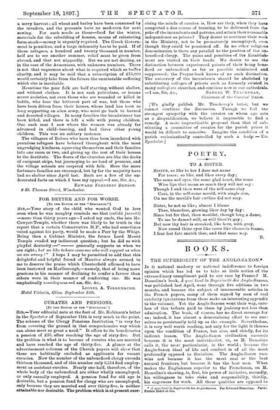CURATES AND PENSIONS.
[TO THY EDITOR OF THZ "SPECTATOR.']
SIR,—Your editorial note at the foot of Mr. Robinson's letter in the Spectator of September 11th is very much to the point. The scheme of the Clergy Pensions Institution "is very far from covering the ground in that comprehensive way which can alone meet so great a need." It offers to its beneficiaries a pension of £35, after reaching the age of sixty-five. But the problem is what is to become of curates who are married and have reached the age of thirty-five. A glance at the advertisement columns of the Church papers will show that these are habitually excluded as applicants for vacant curacies. Now the number of the unbeneficed clergy exceeds thirteen thousand, and of this number only 6,514 find employ- ment as assistant-curates. Nearly one-half, therefore, of the whole body of the unbeneficed are either wholly unemployed, or only casually employed. A pension fund for old age is desirable, but a pension fund for clergy who are unemployed, only because they are married and over thirty-five, is neither attainable nor desirable. The problem which is at present exer-
cising the minds of curates is, How are they, when they have completed a due course of training, to be delivered from the yoke of the incumbents and patrons, and attain their reasonable independence as priests ? They desire to continue their work in the Ministry, not to be prematurely unemployed, even though they could be pensioned off. In no other religious denomination is there any parallel to the position of the un- beneficed clergy. The pains and penalties of the Establish- ment are visited on their heads. We desire to see the distinction between experienced priests of their being bene- ficed or unbeneficed as far as possible minimised and suppressed ; the Prayer-book knows of no such distinction. The autocracy of the incumbents should be abolished by substituting colleges of priests such as formerly existed in many collegiate churches, and continue now in our cathedrals.
Chairman of the Curates' Union.
[We gladly publish Mr. Thackeray's letter, but we cannot continue the discussion. Though we feel the strongest sympathy with the curates on whom age acts as a disqualification, we believe it impossible to find a remedy. A more impracticable proposal than that of sub- stituting a committee of curates for the parish priest it would be difficult to conceive. Imagine the condition of a parish ecclesiastically controlled by such a body. — ED. Spectator.]


































 Previous page
Previous page